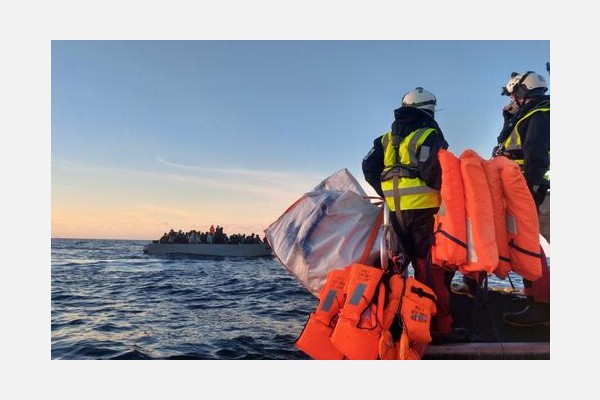Repository of Practices

Ocean Viking - Cooperation between SOS MEDITERRANEE and IFRC for Search and Rescue and Post-Rescue Assistance and Relief
Dates
Type of practice
Summary
The Central Mediterranean Sea is the deadliest known migration route in the world, with more than 20,000 lives lost between 2014 and 2022. This is due to the length of the journey across the sea, the very limited regular pathways to migrate to Europe, increasingly dangerous smuggling patterns, and restriction and obstruction of the lifesaving work of NGOs. On their journeys to Europe, migrants and displaced persons are exposed to human rights violations, human trafficking, violence, slavery, forced labour, abuse, and exploitation. Women, children, and the elderly are especially at risk as they embark on these dangerous journeys. The search and rescue (SAR) NGO, SOS MEDITERRANEE, was founded in 2015 and has, as of August 2023, rescued over 38,847 migrants in distress in the Central Mediterranean, through 322 rescue operations. In August 2021, SOS MEDITERRANEE began a partnership with IFRC to complement its SAR activities with a “Humanitarian Service Point at sea” to provide relief, protection and health services to rescued people. The SAR operations save the lives of thousands of people crossing the Central Mediterranean Sea every year. The partnership with IFRC allows the additional provision of relief and protection to rescued people. On board the Ocean Viking, a team of 25 people from SOS MEDITERRANEE and IFRC/National Societies run the SAR and post-rescue assistance operations. The latter includes health and mental health services, provision of food and non-food items, psychosocial activities to reduce stress and harmful behaviours (for example dance, music and yoga), information sessions (covering topics that include protection mechanisms and Italy’s asylum system ) and restoring family links services (including the SALAMAT service through which rescued people can inform their loved ones that they are alive and on their way to a place of safety). Detection of vulnerabilities, together with the identification of protection risks and needs, is another crucial activity conducted on board. Among other things, it facilitates referrals to post-disembarkation services provided by humanitarian actors onshore, such as the Italian Red Cross. All support extended to survivors adheres to a Protection, Gender, and Inclusion approach, underpinned by the fundamental "do no harm" principle. In addition, onshore, the IFRC has dedicated communications and humanitarian diplomacy resources supporting the project in terms of both public-facing communications (messaging, media) and advocacy to states and EU institutions. In this partnership, SOS Med and IFRC/National Societies team members are not simply working side by side on separate parts of the operations. They are working together, integrated in the same teams, to provide post-rescue medical care and assistance. SOS MEDITERRANEE is funded by private donations, with small grants from French local authorities and the German government. IFRC provides significant financial support for the Ocean Viking.
Other partner organizations include National Red Cross and Red Crescent Societies from Australia, Austria, Belgium, Canada, Denmark, Finland, France, Iceland, Ireland, Italy, Hong Kong, Japan, Kuwait, Monaco, the Netherlands, Sweden, the UK and the USA.
Organizations
Main Implementing Organization(s)
Detailed Information
Partner/Donor Organizations
Benefit and Impact
Before the law changed in Italy in February 2023, it could sometimes take days for the Ocean Viking to find a place of safety to disembark rescued people. When that happened, rescued people became stranded at sea, (as was the case between 22 October and 10 November 2022, for example), exhausted, dehydrated, in psychological distress and some required immediate medical attention. In such circumstances, the humanitarian services provided on board the Ocean Viking become even more essential to keep rescued people alive while awaiting disembarkation.
The partnership with IFRC complements search and rescue operations with post-rescue humanitarian assistance and relief. After rescuing migrants, the humanitarian services on board, including medical and psychosocial support, can be life-saving in a slightly less direct sense: they contribute to restoring migrants’ dignity by providing individual assistance immediately and planning for continuity of care based on their specific needs and circumstances (women and children’s specific needs are taken into account with specific activities and support provided onboard and organised ashore).
There is no initial end date to this practice as needs continue to exist in the Central Mediterranean Sea. The partnership is financed until February 2024.
Key Lessons
Recommendations(if the practice is to be replicated)
For example, both partners share the advocacy objective of the United Nations recognising the Central Mediterranean as a “humanitarian space” where a humanitarian crisis is unfolding. This would trigger a humanitarian response that would be commensurate with the level of needs, with UN agencies such as OCHA, UNICEF, WHO, and UNFPA, among others, getting involved. It would allow for a Humanitarian Response Plan to be drawn up and for funding to be available from agencies such as ECHO, DFID, etc. However, to date, the crisis in the Mediterranean has mostly been construed as a migration crisis requiring national and regional level migration management policies rather than humanitarian and civil protection responses.
Innovation
Additional Resources
Date submitted:
Disclaimer: The content of this practice reflects the views of the implementers and does not necessarily reflect the views of the United Nations, the United Nations Network on Migration, and its members.
More Related Practices:
- Talleres de facilitación de diálogos de saberes: Introducción a la metodología de los diálogos interculturales
- Social Security Extended for Migrant Domestic Workers in Malaysia
- Research on human rights violations against live-in domestic workers, and related Code of Good Practice
- One Wage Campaign (OWC)
- Migrant Domestic Workers Rights on the Threshold of Czech Households
Peer Reviewer Feedback:
*References to Kosovo shall be understood to be in the context of United Nations Security Council resolution 1244 (1999).
Newsletter
Subscribe to our newsletter.